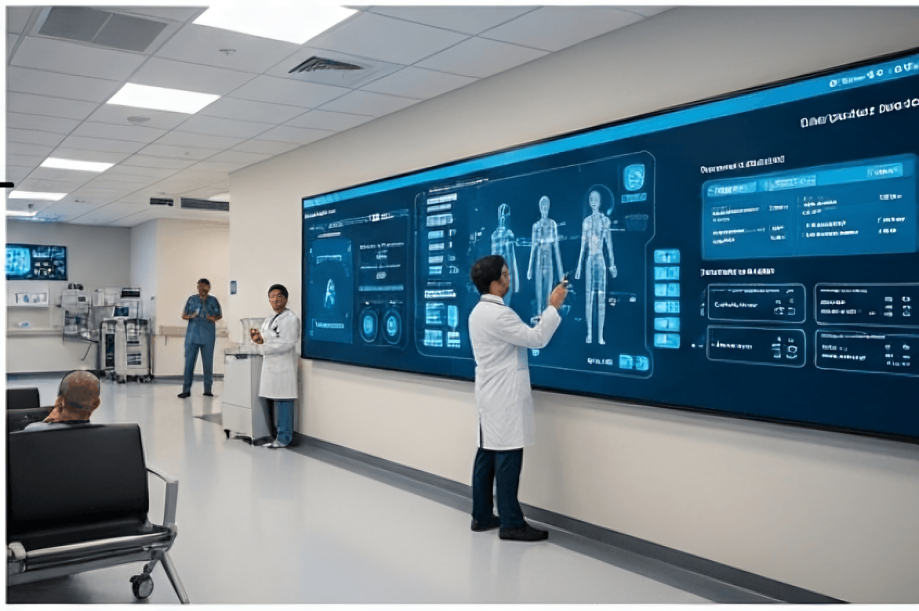The Digital Shift in Modern Healthcare
The healthcare industry is experiencing a massive digital transformation. Hospitals, clinics, and diagnostic centers are turning to innovative IT solutions to enhance patient care, streamline operations, and improve data accuracy. Technology is no longer a supporting tool; it has become the backbone of modern healthcare.
From artificial intelligence to cloud-based systems, healthcare technology is reshaping how patients interact with doctors and how organizations manage critical health information. The shift is about delivering faster, safer, and more personalized care and companies like Raks IT Solutions are helping healthcare providers make that transformation a reality.
The Importance of IT in Healthcare
The integration of IT into healthcare is not just a trend; it’s a necessity. Medical institutions today handle massive volumes of patient data that must be stored, managed, and accessed securely. IT solutions bring efficiency, accuracy, and transparency to these processes.
Some of the key reasons why healthcare organizations are investing heavily in IT include:
- Data Management: Digital record systems reduce the need for paper documentation and make patient data easily accessible to authorized users.
- Improved Patient Care: Real-time data allows doctors to make informed decisions, improving treatment accuracy.
- Operational Efficiency: Automation minimizes administrative errors, saving time and resources.
- Regulatory Compliance: IT systems help healthcare institutions comply with data protection and privacy laws.
- Better Communication: Collaboration between departments becomes seamless with centralized systems.
By adopting digital tools and software, healthcare providers can focus more on patient well-being instead of struggling with manual processes.
Key Technologies Driving Healthcare Innovation
1. Electronic Health Records (EHR)
EHR systems have revolutionized the way patient information is stored and shared. Instead of paper files, all patient details are recorded digitally, allowing instant access for doctors and specialists. This ensures continuity of care and minimizes the risk of data loss.
Raks IT Solutions offers advanced EHR integration services that help healthcare providers manage data securely and efficiently.
2. Telemedicine and Remote Care
Telemedicine platforms have made healthcare more accessible, especially for patients in remote areas. Through video consultations and mobile health apps, doctors can provide care without requiring physical visits.
This approach not only saves time but also reduces hospital congestion. Patients can consult doctors, get prescriptions, and monitor their health from the comfort of their homes.
3. Artificial Intelligence (AI) and Machine Learning
AI is transforming healthcare diagnostics, drug discovery, and patient management. Machine learning algorithms analyze large datasets to predict diseases, recommend treatments, and even detect anomalies in medical images.
Hospitals are increasingly implementing AI-based decision-support systems to assist doctors in diagnosing complex conditions faster and more accurately.
4. Cloud Computing
Cloud-based healthcare systems have made it easier to store, access, and share medical data securely. These solutions reduce infrastructure costs and allow healthcare organizations to scale effortlessly.
Cloud platforms also enable collaboration among doctors, labs, and pharmacies, ensuring that patient data remains synchronized and updated across multiple systems.
5. Internet of Medical Things (IoMT)
IoMT connects medical devices to networks, allowing real-time data monitoring. Wearable devices such as fitness trackers, glucose monitors, and heart rate sensors provide valuable data that healthcare professionals can analyze to improve patient outcomes.
This continuous data flow helps in preventive healthcare by identifying health risks before they become severe.
Benefits of Implementing IT Solutions in Healthcare
Healthcare IT solutions offer long-term benefits to hospitals, clinics, and patients alike.
- Enhanced Accuracy: Automated systems reduce manual data entry errors.
- Improved Patient Experience: Digital platforms make booking appointments and accessing medical records easier.
- Faster Decision-Making: Doctors can instantly access complete patient histories.
- Cost Savings: Automation and cloud solutions minimize operational expenses.
- Security and Compliance: Advanced encryption and authentication safeguard sensitive patient data.
- Data Analytics: Hospitals can analyze trends and performance metrics for better decision-making.
By working with technology partners like Raks IT Solutions, healthcare organizations can build customized systems that fit their exact needs and future goals.
Challenges in Healthcare IT Implementation
While technology brings many advantages, it also comes with challenges that healthcare providers must address:
- Data Privacy and Security: Healthcare data breaches can have severe consequences. Strong cybersecurity measures and compliance with regulations such as HIPAA are essential.
- Integration with Legacy Systems: Many hospitals still use outdated infrastructure that is difficult to integrate with modern applications.
- Training and Adoption: Staff must be trained to use new systems effectively.
- Cost of Implementation: While IT systems save money in the long term, the initial investment can be high.
- Regulatory Challenges: Governments often update healthcare policies, and IT systems must stay compliant.
Raks IT Solutions works closely with healthcare organizations to ensure smooth implementation, providing both the technology and support needed to overcome these challenges.
How IT Solutions Improve Patient Outcomes
Technology has shifted healthcare from being reactive to proactive. Instead of waiting for diseases to worsen, doctors can now use predictive analytics to identify potential health risks early.
For instance:
- AI tools can detect early signs of diseases like cancer or diabetes.
- Wearables can monitor heart rate, sleep, and activity levels in real time.
- Data analytics can help hospitals predict patient inflow, improving resource allocation.
This digital approach enables better prevention, faster treatment, and improved patient satisfaction.
The Role of Custom Software Development in Healthcare
Every healthcare organization has unique needs, and off-the-shelf software rarely fits perfectly. Custom software development provides tailor-made solutions that align with specific workflows, compliance requirements, and data management goals.
Some examples include:
- Appointment scheduling applications
- Patient portals
- Medical billing software
- Laboratory management systems
- Pharmacy inventory solutions
By choosing a technology partner like Raks IT Solutions, healthcare providers can develop custom solutions that integrate seamlessly with their existing systems and grow as their operations expand.
The Future of Healthcare Technology
The next decade will bring even more advancements in healthcare IT. Some emerging trends include:
- Blockchain in Healthcare: Providing secure, transparent, and tamper-proof medical data exchange.
- Augmented Reality (AR) in Surgery: Helping surgeons visualize anatomy in real time.
- Robotic Process Automation (RPA): Streamlining repetitive administrative tasks.
- 5G Connectivity: Enhancing telemedicine with faster, more reliable communication.
- Voice Search and AEO Optimization: Patients using voice assistants to find healthcare information easily.
Staying ahead in this fast-paced environment requires innovation, adaptability, and a trusted IT partner capable of building scalable, future-ready systems.
Building a Healthier Digital Tomorrow
Technology is the foundation of modern healthcare. As hospitals, clinics, and diagnostic centers continue to adopt digital systems, the focus must remain on improving patient care, ensuring data security, and maintaining operational efficiency.
With years of expertise in healthcare technology, Raks IT Solutions is committed to helping organizations design, develop, and deploy intelligent healthcare IT systems that truly make a difference.
Whether it’s through EHR implementation, telemedicine platforms, or AI-driven healthcare analytics, the future of medicine will rely on the intelligent use of technology. By embracing these innovations, healthcare providers can deliver better care, faster services, and safer outcomes for everyone.




